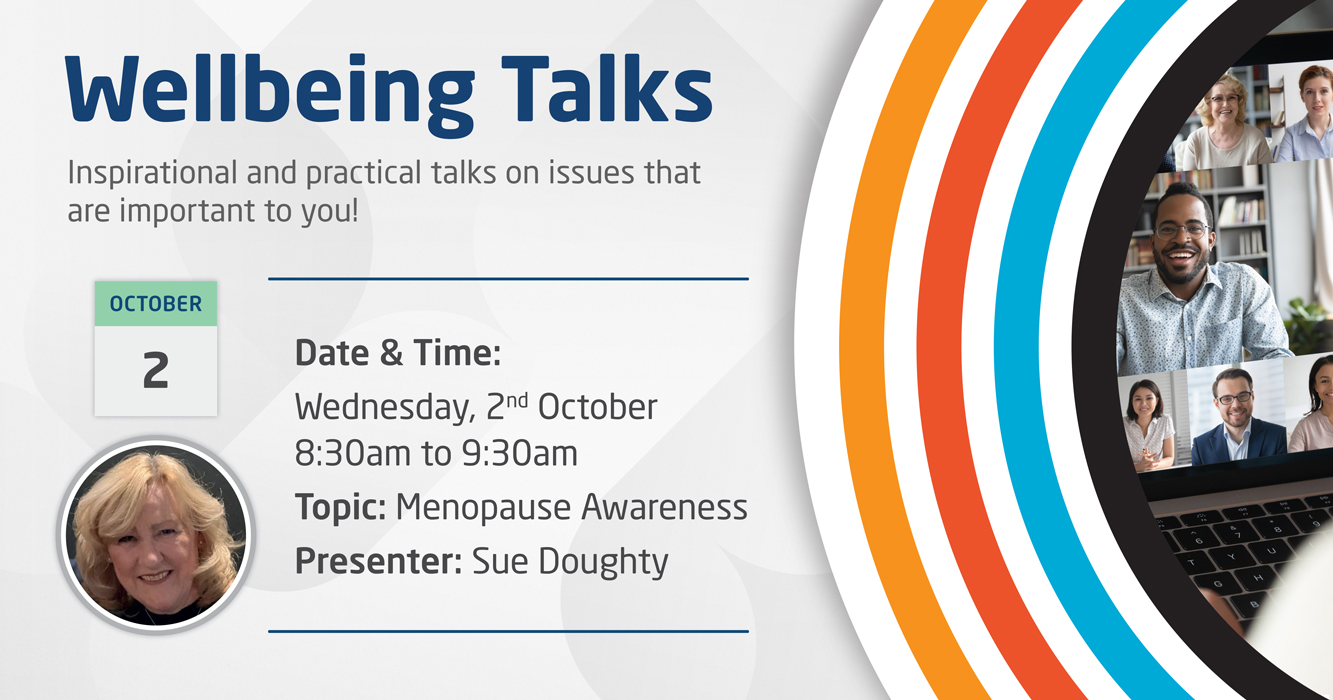October
Menopause
Despite popular belief, menopause is not just a women’s issue! Male counterparts, colleagues, friends and relatives are also impacted by menopause. That’s why it is important to educate ourselves on the menopause.
Information taken from BRITISH MENOPAUSE SOCIETY

What is Menopause – myth-busting
Menopause is the time in a woman’s life when her periods stop because of the reduction and loss of “ovarian reproduction function”. Ovaries produce the hormones oestrogen, progesterone, and testosterone. When a woman approached the menopause, less oestrogen is produced causing her body to behave differently.
Menopause normally occurs between 45 and 55 years of age. The average age in the UK is 51. It is defined as when a woman has not had a period for one year or more. Before then a woman will experience early perimenopause and late perimenopause.
Early peri-menopause – Change in menstrual cycle pattern, period become infrequent, and cycle lasts slightly longer – average age is around 47.
Later peri-menopause – worsening of menopausal symptoms, cycles become less frequent with periods a few months apart – average age is around 49.
Common Myths:
- Menopause never starts before the age of 50.
- Nothing can be done to manage symptoms – you just have to get on with it.
- Hormone Therapy is dangerous.
- Sex after menopause is almost impossible.
- Weight gain in inevitable.
- The first sign of menopause of hot flushes.
- After menopause your body doesn’t produce hormones.
- The older you are when your periods start, the older you will be when menopause starts.
- Menopause only causes physical symptoms.
What is HRT?
Hormone Replacement Therapy (HRT) is a treatment used to relieve symptoms of the menopause. It replaces the female hormones that are at a lower level as you experience the menopause. Oestrogen and progesterone are female hormones that play important roles in a woman’s body.
The main benefit of HRT is that it’s effective at relieving most perimenopause and menopause symptoms, such as:
- hot flushes
- night sweats
- sleep problems caused by menopause
- anxiety and low mood caused by menopause
- vaginal dryness
Menopause in the workplace
Up to a third of women will experience severe menopausal symptoms that can impact on their quality of life. It is in the work context that women often report greater difficulty in managing symptoms and can feel embarrassed and unable to disclose their menopausal status, fearing they may be stigmatised for being menopausal.
The most commonly reported difficulties that menopausal women report at work include poor concentration, tiredness, poor memory, feeling low/depressed and lowered confidence. Problematic hot flushes at work have also been linked to women having a higher intention to leave the workforce.
Employers are being encouraged to offer awareness and support to this population of employees and British Menopause Society has brought together resources to help both employers and employees.
Common Women’s Health Issues
Overweight and obesity
Weight is something that we struggle with regardless of gender. However, obesity is listed as a pressing women’s health issue by a number of health insights. Nearly a third of women are overweight and an additional quarter of women are obese. (British Nutritional Foundation).
Obesity can increase the risk of a number of serious health conditions, such as:
- Type 2 diabetes
- Heart disease and stroke
- Some types of cancer, such as breast cancer and bowel cancer
If you’re overweight, losing weight has many health benefits. Making small, simple changes to what and how much you are eating and drinking can really help you lose the pounds. Find NHS approved resources here: https://www.nhs.uk/better-health/lose-weight/
Breast cancer
Breast cancer is the most common cancer in women in the UK. Around 1 in 8 women will be diagnosed with breast cancer in their lifetime and 1 in 5 of those diagnosed will be below the age of 50 years.
Be sure to check your chest, even if you are not female! There is a common misunderstanding that only women can be diagnosed with breast cancer, but this is not the case! Learn more with CoppaFeel: https://coppafeel.org/
Cardiovascular disease
Cardiovascular disease (CVD) is a general term for conditions affecting the heart or blood vessels (includes heart disease and stroke). It is one of the main causes of death and disability in the UK. Whilst closely linked with men’s health, CVD kills as many women as it does men. In older adults, it is actually more common in women than men. However, there are a few things you can do to help reduce your risk:
- Maintain a healthy bodyweight
- Get your blood cholesterol checked
- Maintain a normal blood pressure. Over a quarter of women in England have a high blood pressure (hypertension). You can help to reduce your risk of hypertension by cutting down on salt and alcohol, eating lots of fruit and vegetables, maintaining a healthy bodyweight and increasing your physical activity levels
- If you drink alcohol, limit your intake to no more than 14 units per week
- Do not smoke
- Try to exercise regularly
- Enjoy a healthy, balanced diet
Taken from: https://www.nutrition.org.uk/life-stages/women/common-health-issues-in-women/

